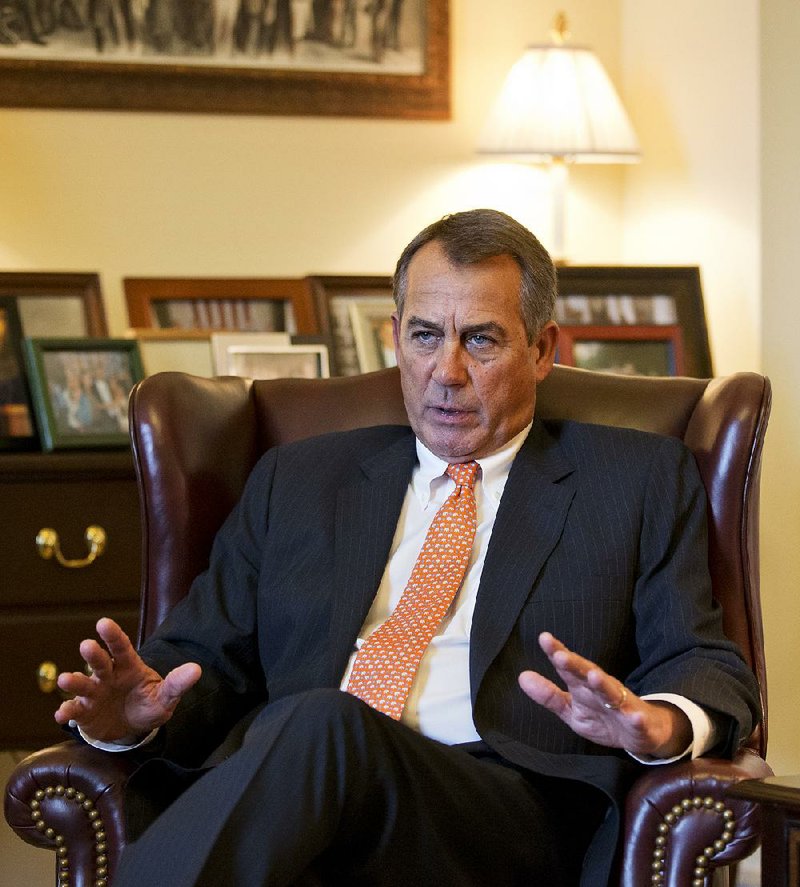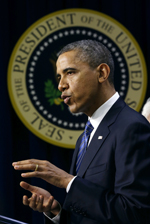WASHINGTON — Congressional Republicans on Wednesday opposed many of the details President Barack Obama set out in his second-term agenda in his State of the Union address to Congress, signaling that the political fights of the past aren’t over yet.
Meanwhile, Obama stood in a resurrected factory in North Carolina, imploring lawmakers to work as hard as American blue-collar workers as he pitched his plan to jump-start manufacturing and expand opportunities for the middle class.
House Speaker John Boehner dismissed the president’s proposal to raise the federal minimum wage. Republicans also gave a negative response to Obama’s call for new legislation to curb greenhouse-gas emissions that scientists say fuel global warming.
“When you raise the price of employment, guess what happens? You get less of it,” Boehner, an Ohio Republican, told reporters at a news conference Wednesday in Washington. “Why do we want to make it harder for small employers to hire people?”
In his speech Tuesday night to a joint session of Congress, Obama proposed raising the hourly federal minimum wage to its highest inflation-adjusted value since 1981, under President Ronald Reagan, according to a White House fact sheet.
Obama’s speech was a “got hrough-the motions laundry list of things” he’d “like to do,” said Sen. John Thune of South Dakota, a member of the chamber’s Republican leadership.
“Minimum wage won’t pass the House, climate change won’t pass the House,” Thune said. “Those are things he would probably have a hard time getting a lot of Democrats to vote for.”
The same is true for Obama’s call for guaranteeing preschool programs for all 4-year-olds, he said. “How do you pay for it?” he said. By saying the programs wouldn’t “add a single dime to the deficit” Obama is expecting Congress to raise taxes “to finance all these new programs,” he said.
Senate Democrats seeking re-election next year in states that supported Republican presidential candidate Mitt Romney in 2012 “are going to be hard-pressed to vote for” new tax revenue beyond increases that have been passed, Thune said.
Boehner also questioned the need for the federal government to get involved in early-childhood education, saying it was “a good way to screw it up.”
The president also urged Congress to pass immigration legislation and stricter guncontrol measures and asked for $50 billion in infrastructure spending.
Senate Minority Leader Mitch McConnell on Wednesday called Obama’s speech a “liberal boilerplate that any Democratic lawmaker could have given at any time in recent memory.”
“He advocated tax reform, but mostly as a way to increase the size of government, not as a way to increase our competitiveness,” McConnell, a Kentucky Republican, said in a floor speech. “He spoke of workers’ minimum wages, instead of their maximum potential.”
The speaker’s comments on Obama’s proposal to raise the hourly minimum wage to $9 from $7.25 by the end of 2015 reflected a long-standing Republican argument that such increases only depress employment among young and low-skilled workers.
The last federal minimumwage increase was in 2009, the first year of Obama’s presidency, though it came out of a 2007 law signed by President George W. Bush. A new increase would affect an estimated 15 million people. Obama also suggested making the minimum wage rise with the cost of living.
Boehner signaled an increase had little prospect of passing the House.
“A lot of people who are being paid the minimum wage are being paid that because they come to the work force with no skills and this makes it harder for them to acquire the skills they need in order to climb that ladder successfully,” Boehner said.
Rep. Jack Kingston, Georgia Republican, said a minimum-wage measure would “have a chance” if it is accompanied by a “business package of tax credits and expensing” rules to help small businesses. Obama needs to make “a good argument of here’s how we can grow jobs and help small business,” he said in an interview.
On immigration, Rep. Paul Ryan, a Wisconsin Republican who was his party’s 2012 vice-presidential nominee, said on CNN that Obama’s statements were “pretty productive.”
The president said he wanted strong border security and “a responsible pathway to earned citizenship,”including paying taxes and a “meaningful penalty” and getting in line behind others seeking to enter the country legally.
Obama “used the right words, the right tone, which tells me he actually doesn’t want to politicize” immigration, Ryan told reporters in the Capitol. That is “conducive” to reaching a bipartisan agreement, he said.
Obama’s call for new legislation to slow climate change isn’t “an issue that’s going to resonate in a very sluggish economy,” said Republican Rep. Charlie Dent of Pennsylvania.
“Raising energy prices is probably not going to stimulate economic growth.”
Dent, who represents one of the nation’s top coal-producing states, said climate legislation “is going to have some very negative impacts on consumers, manufacturers and farmers. I don’t see that getting anywhere.”
Republican Sen. Kelly Ayotte of New Hampshire said Obama “mentioned a number of new items on spending; I didn’t hear how we are going to pay for them.”
Ryan said Obama’s speech reflected an apparent desire to “sweep the debt crisis under the rug, and for the life of me I don’t understand why they think they are going to get away with that.”
Rep. Randy Neugebauer, a Texas Republican, said the address “is the same speech that the president has been giving1 over the last 4/2 years,” calling for “more taxes, more spending, more government.”
“The president continues to subscribe to a very liberal and progressive agenda” that isn’t “going to fare very well” in Congress, Neugebauer said.
Rep. Sander Levin, a Michigan Democrat, dismissed Republican complaints that Obama wasn’t specific about how to curb entitlement programs such as Medicare or avert $1.2 trillion over nine years in across-the-board spending cuts set to begin March 1.
The State of the Union isn’t “the night for all the specifics,” Levin said in an interview. “It was a ‘let’s-doit’ speech.”
Hours after delivering his first State of the Union address of his second term, Obama on Wednesday issued a new challenge to a nation still picking itself up from an economic slump: “If you work full time, you shouldn’t be in poverty.”
“There’s no magic bullet here, it’s just some commonsense stuff. People still have to work hard,” Obama said at an auto-parts plant in Asheville, N.C. He argued that just a few changes - such as increasing the minimum wage, investing in research and incentivizing companies to do business in the U.S. - could go a long way toward a resurgence in American manufacturing.
With sleeves rolled up on his white dress shirt, Obama gazed up at giant, high-tech milling machines, each the size of a small room - symbols of a dispirited American manufacturing sector that Obama insisted can thrive once again.
Joining him for the tour were workers from Linamar Corp., a Canada-based company that produces heavyduty engine and drivetrain components.
The company moved in to a defunct Volvo plant and has hired 160 workers at the Asheville plant, with plans to hire 40 more by the end of the year, Obama said.
Today, Obama will seek support for his proposals in Georgia, before making his case on more familiar terrain Friday with a visit to Chicago - his hometown.
Obama and lawmakers face looming fiscal crises confronting the nation: the deep automatic spending cuts, called a “sequester,” to take effect March 1, followed by the government running out of money to fund federal agencies March 27.
Boehner expressed doubts Wednesday that the Republican-led House and Democratic-controlled Senate could reach agreement on a budget and avoid automatic spending cuts.
He also reiterated his opposition to letting the sequester take effect, and served up a reality check to members of his caucus who say publicly that they would be willing to let the cuts take effect.
“None of them have ever lived under a sequester. For that matter, neither have I,” Boehner said.
“This is going to be a little bleak around here when this actually happens and people actually have to make decisions.”
The president wants to put off the sequester through a combination of targeted spending cuts and increased tax revenue. Republicans want to offset the sequester with spending cuts alone.
Information for this article was contributed by James Rowley, Roxana Tiron, Mike Dorning and Margaret Talev of Bloomberg News and by Josh Lederman, Julie Pace, Andrew Taylor, Erica Werner and Stephen Ohlemacher of The Associated Press.
Front Section, Pages 1 on 02/14/2013


